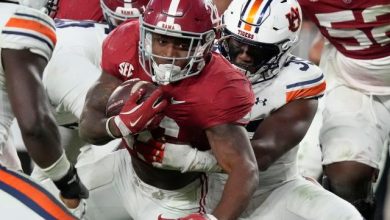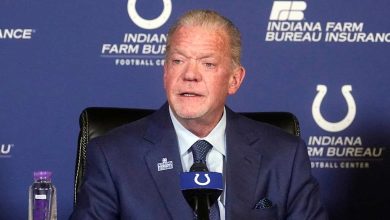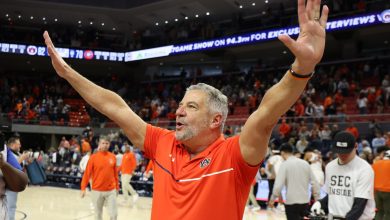Paul Finebaum expresses concern about the Georgia Bulldogs’ 2025 season, citing potential challenges in roster development, coaching, and competition that could impact their future success.

The Georgia Bulldogs have established themselves as a powerhouse in college football over the past few years, capturing national titles, producing NFL talent, and maintaining a relentless winning culture under head coach Kirby Smart. However, even the most successful programs face uncertainties about their future, and recent comments by prominent sports analyst Paul Finebaum have sparked discussion about the Bulldogs’ prospects for the 2025 season.
Finebaum, known for his incisive insights and candid opinions on college football, recently proclaimed that he is “worried” about Georgia’s 2025 season. While such statements may seem alarmist at first glance, they stem from legitimate concerns rooted in roster development, coaching transitions, and the evolving landscape of college football. This article delves into the reasons behind Finebaum’s apprehension, examining each factor in detail, and assessing what it means for Georgia’s future.
Context: Georgia’s Recent Dominance and the Stakes for 2025
Since Kirby Smart’s arrival as head coach in 2016, Georgia has experienced a renaissance, culminating in back-to-back national championships in the 2021 and 2022 seasons. Their mix of elite recruiting, strategic excellence, and player development has made them a perennial contender.
However, success breeds its own set of challenges. Key players graduate or declare for the NFL draft, and maintaining sustained excellence requires a continuous pipeline of talent, innovation, and adaptability. The 2025 season marks a pivotal point for Georgia — a transition year where the program must replace significant personnel and adjust to a changing competitive environment.
Finebaum’s concern reflects the broader realities facing Georgia: the difficulty of sustaining top-tier performance amid roster turnover, coaching changes, and shifting NCAA and SEC dynamics.
Roster Development: The Challenge of Sustaining Talent
One of the primary concerns voiced by Finebaum pertains to roster development. Georgia, like many elite programs, relies heavily on recruiting the best high school talent and developing it into NFL-ready players. Over the years, Georgia has been a recruiting juggernaut, consistently ranking among the top classes nationally.
The Loss of Key Players
By 2025, Georgia is expected to lose a significant number of impact players, including star quarterbacks, defensive standouts, and offensive skill position players who have already declared for the NFL or exhausted their eligibility. The departure of a roster’s core can create a talent gap if the incoming recruits are not of similar caliber or if the program struggles to develop them quickly.
Recruiting Challenges
While Georgia remains a recruiting powerhouse, the landscape is more competitive than ever. SEC programs like Alabama, LSU, and Florida, along with national contenders like Ohio State and Clemson, are aggressively recruiting top prospects. The transfer portal has also altered the recruiting paradigm, allowing programs to fill gaps with experienced transfer players, but it also means the competition for talent is fiercer.
Developmental Concerns
Finebaum’s worry may stem from the potential difficulty of developing new players to the same high standard that Georgia has historically maintained. The program’s success in recent years has been built on a combination of elite recruiting and player development, but with a changing roster, there’s always a risk that the new talent might not mesh immediately or reach the same level of performance.
Coaching Transition: Stability and Change
While Kirby Smart is widely regarded as one of the top coaches in college football, transitions and coaching staff changes can impact team performance.
The Impact of Staff Departures
By 2025, some of Smart’s trusted assistants may have moved on to head coaching jobs elsewhere or been replaced. Changes in coaching staff can influence recruiting pipelines, strategic consistency, and team culture.
Smart’s Longevity and Future Plans
Although Kirby Smart has demonstrated stability and success, any long-term coaching tenure carries inherent risks. Finebaum’s concern may include fears that a future coaching change or staff turnover could disrupt Georgia’s system, especially if it occurs close to or during the 2025 season.
Adaptability and Innovation
Another coaching-related concern revolves around Smart’s ability to adapt to evolving college football trends, such as increased emphasis on offensive innovation, defensive schemes, or NIL (Name, Image, Likeness) strategies. Ensuring the coaching staff remains ahead of the curve is vital for sustained success.
The Evolving Landscape of College Football
College football is undergoing a seismic shift due to the introduction of NIL rights, transfer portal regulations, and conference realignment.
NIL and Transfer Portal Impact
NIL has created a more competitive environment for securing top players, as individual athletes now have financial incentives beyond scholarships. While Georgia has historically been adept at recruiting and developing talent, the NIL landscape can advantage programs with larger budgets or better local recruiting bases.
The transfer portal has allowed players to move more freely, creating roster volatility. Georgia might face challenges if key players opt to transfer elsewhere or if incoming transfers do not integrate seamlessly.
Conference Realignment and Competitive Balance
The SEC continues to evolve, with new members and expanded media rights deals. These changes could alter the level of competition Georgia faces in the coming years. While the SEC remains highly competitive, shifts in conference dynamics could impact Georgia’s ability to dominate or even maintain their current competitive advantage.
Specific Concerns for the 2025 Season
Quarterback and Skill Position Uncertainty
Quarterback play is often decisive in college football, and Georgia’s future signal-callers are yet to be determined. The development or transfer of a new quarterback will be critical. Finebaum’s worry might include doubts about the readiness of the next quarterback or the ability of the offensive system to adapt.
Defensive Transition
Georgia’s defense has been a cornerstone of their success, but key defensive stars are graduating. The challenge lies in replacing high-caliber players and maintaining defensive dominance against increasingly innovative offenses.
Depth and Injury Risk
Sustaining a championship-caliber team requires not just talent but depth. Injuries or fatigue could expose vulnerabilities if Georgia’s depth diminishes or if the team struggles to develop backups.
Competition from Other Programs
The SEC is arguably the most competitive conference nationally. Programs like Alabama, LSU, Tennessee, and Florida are all investing heavily to challenge Georgia’s supremacy. The rise of these programs, coupled with Georgia’s roster turnover, could make the 2025 season more difficult.
Broader Implications and Strategic Considerations
Finebaum’s concerns highlight broader strategic issues for Georgia:
- Sustaining a Winning Culture: Maintaining their high standards amid roster and staff changes.
- Adapting to NIL and Transfer Dynamics: Leveraging NIL to retain and attract talent.
- Balancing Recruiting and Development: Ensuring incoming players develop quickly without relying solely on recruiting rankings.
- Long-Term Planning: Preparing for coaching staff succession and evolving conference landscapes.
The Optimist’s Perspective: Why Georgia Could Still Thrive
While concerns are valid, it’s important to recognize Georgia’s resilience and strategic strength:
- Strong Recruiting Pipeline: Georgia remains a top recruiting destination.
- Elite Facilities and Resources: The program’s infrastructure supports player development.
- Smart’s Proven Track Record: The coach’s adaptability and leadership have been pivotal.
- Culture of Excellence: The program’s standards foster continuous improvement.
These factors suggest that, despite challenges, Georgia has the tools to navigate the uncertainties of the 2025 season successfully.
A Cautiously Optimistic Outlook
Paul Finebaum’s recent declaration that he is “worried” about Georgia’s 2025 season reflects a realistic acknowledgment of the hurdles ahead. Roster turnover, coaching transitions, NIL complexities, and a fiercely competitive SEC are all factors that could complicate Georgia’s path to continued success.
However, Georgia’s established excellence, recruiting prowess, and leadership stability provide a strong foundation. While the 2025 season may present unique challenges, it also offers an opportunity for the Bulldogs to demonstrate resilience, adaptability, and sustained greatness.
In the end, every successful program faces transitional periods. Georgia’s ability to manage these effectively will determine whether Finebaum’s concerns materialize into reality or if the Bulldogs will once again defy the odds and remain among college football’s elite.









